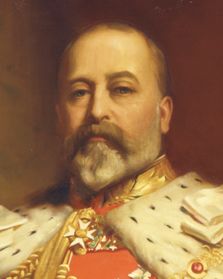9 November: Boreham on King Edward VII
 A Modest Regime
A Modest RegimeThis is the birthday of King Edward VII. For ten years, the date was observed as a public holiday. Nowadays it is allowed to pass in silence. No British sovereign ever slipped out of history as quietly and completely as he has done. It is a thousand pities. He is worth remembering, for, as Sir Charles Petrie has pointed out, no wearer of our Crown did more than he to bring the Throne into vital and palpitating touch with the life of the common people. In this respect he set a new fashion in kingship. Those who knew London in the early days of the century will remember meeting him on the streets. He was quite unattended. Walking along like any ordinary citizen, he would watch the traffic, glance at passers-by, and occasionally pause in front of a shop window. It is difficult to imagine any of his predecessors behaving similarly.
The life of Edward the Seventh represents a stately romance. It opened unfortunately. His childhood was by no means a happy one. No boy was ever subjected to so many harsh regulations, severe restrictions, and unnatural repressions. He was permitted to play no games, to read no books, and to have no companions of his own age. He spent all his time in the company of very excellent, but distinctly elderly, gentlemen. He was not even allowed to be alone. Ceaselessly watched, he was resentfully conscious of the galling guardianship. His education was made as nauseous as it was possible to make it; the text books employed were as dreary as the Sahara. Most people, knowing the facts, sincerely pitied him.
A Lover Of His Fellow-Men
Left, during those long years, to his own devices, the prince developed an extraordinary genius for getting to know all sorts and conditions of men. He sincerely believed that every man he met was capable of teaching him something, and his mind was ravenous for that morsel of knowledge. Sir Sidney Lee says that he developed an uncanny faculty for extracting the most valuable information from the most unpromising sources. He simply revelled in an animate conversation; and, although never a brilliant talker, atoned by the grace and charm of his manner for any deficiency in self-expression. He possessed, moreover, the inestimable advantage of being able to make himself delightfully at home in any country and in any company.
He travelled widely because he thoroughly enjoyed it. But there was a deeper reason. Shuddering at the very thought of war, he honestly believed that the best way of preserving the peace was to encourage the nations to cultivate each other's intimate acquaintance. There were no Iron Curtains or Bamboo Curtains or any other separating and segregating partitions in his day. He went everywhere; was hail- fellow-well-met with everybody, and he aspired, above everything else, to impress the princes, potentates, and peoples of Europe with a sense of British friendship and good will.
Blunt Man For An Uneventful Time
Summarising his basic and essential characteristics, Sir Sidney Lee lays stress on his physical courage, his fondness for animals, his fidelity to his friends, and the breadth of his interests and sympathies. There was a certain robust but exquisite chivalry about him. Loathing ill-natured gossip, he could slay at a glance any man who lightly uttered in his presence a sinister or malicious word. The soul of loyalty to his friends and associates, he never forgot a kindness, no matter how trivial, and would astonish his benefactor by recalling it on some suitable occasion many years afterwards.
The placid temper of his time, and the tranquil events that marked his reign, gave him no opportunity of displaying the more Homeric qualities of kingship. It was not his to mount the whirlwind or to ride the storm. He will always be remembered as a typical English gentleman. Born in another environment, he would have made an excellent Scottish laird, or, dwelling in a secluded countryside, would have made the perfect village squire. He was, above everything else, essentially a man of the world, gifted with abounding and overflowing humanity, suffused, in his later days, by a simple and sturdy piety. If he is destined to occupy a relatively modest and obscure place in English history, he nevertheless gave us abundant reason to keep his memory green. The prosaic record of his reign will always be cherished by those who felt the radiations of his quiet goodness and realised the magnetism of his charm.
F W Boreham
Image: King Edward VII


<< Home